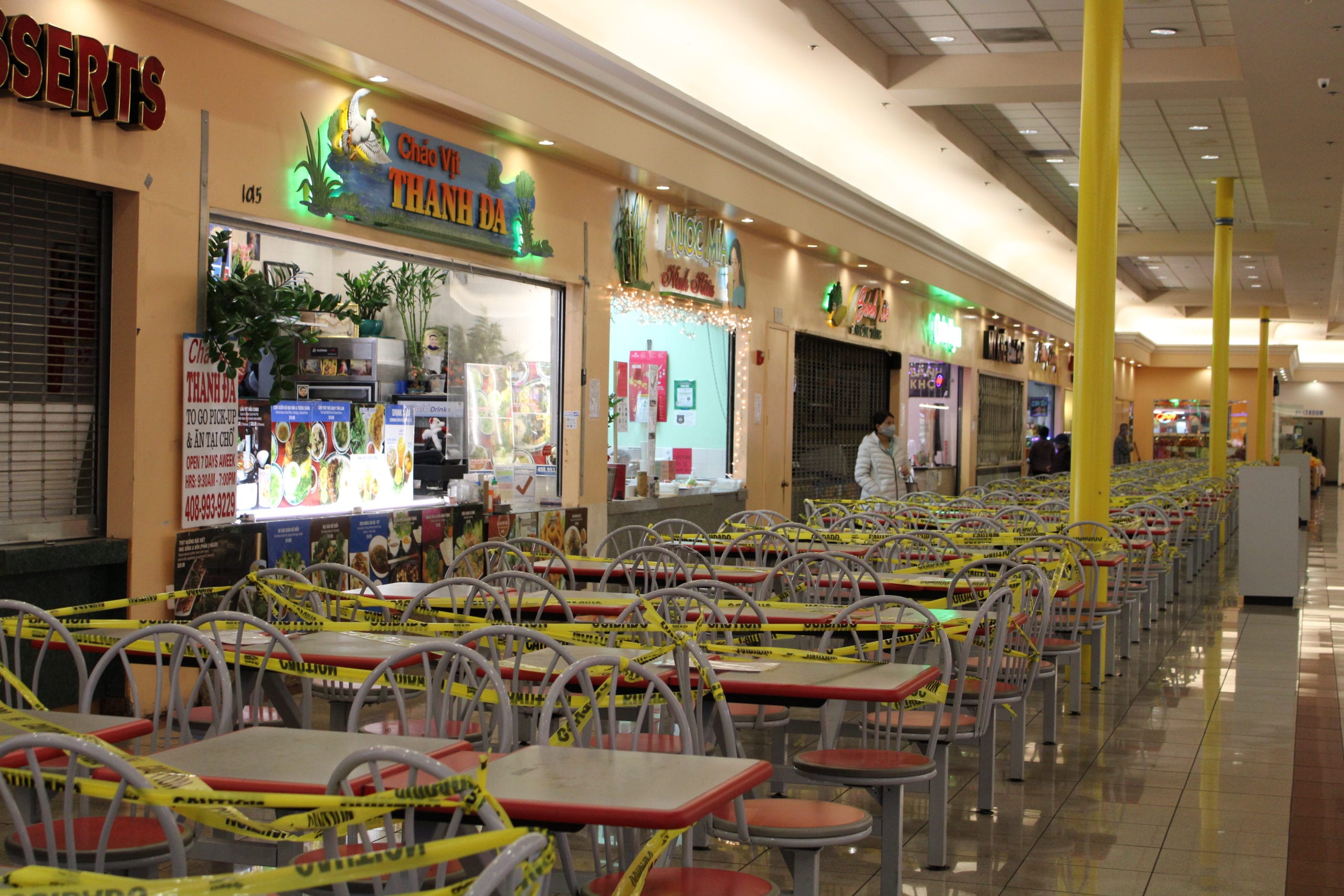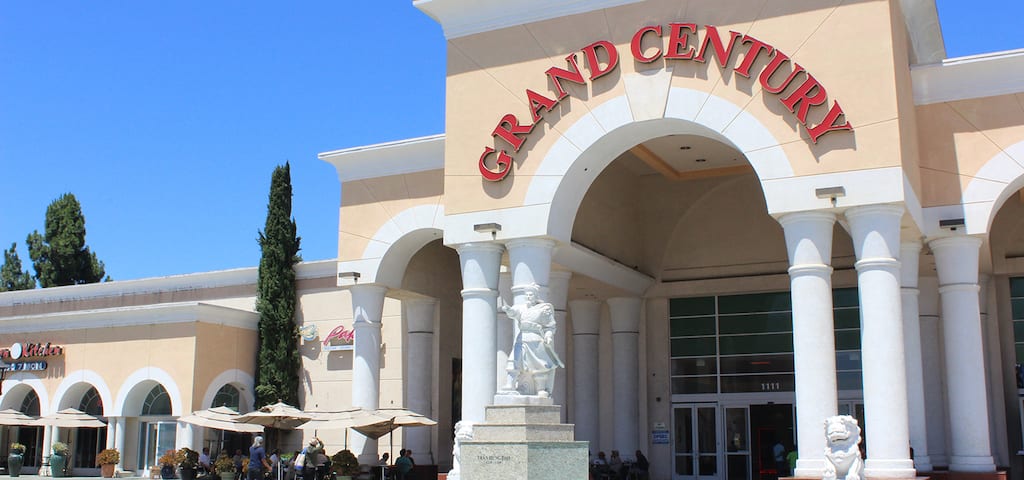Every day at 10 a.m., Nancy steps under the white arches of Grand Century Mall and pushes open the glass doors of her store, Lac’s Skincare & Cosmetics.
Sometimes she’ll watch an Asian drama on her laptop. Other times, she’ll sit and people watch behind a countertop brimming with unopened skin care products. There’s the rare customer, of course, who might inquire about wrinkle prevention creams with just their eyes peeking out over their face mask.
But more often than not, she sits and waits.
“Right now, everyone’s wearing a mask. No one needs skincare products, so I haven’t been able to sell anything,” said Nancy, who declined to give her last name.
Not far from Nancy’s store, inside the food court, an employee there said the mall has lost 80% of its customers.
“It’s barren, paralyzed,” the employee, who works at Cháo Vịt Thanh Đa, a porridge restaurant, said in Vietnamese. “Some days, we sell only tens of dollars’ worth of food.”
The employee asked not to be identified.
She motions to the shuttered storefront of Bánh Xèo Đinh Công Tráng, a popular Vietnamese crepe stand that was known for attracting long lines of hungry guests. Taped to the wall is a piece of paper from the owner — an open call for anyone interested in a lease takeover.

It’s not an uncommon sight nowadays in Grand Century Mall, the Vietnamese shopping center on Story Road that sits at the entrance of Little Saigon. The mall is home to around 100 businesses: restaurants serving regional Vietnamese cuisine, hair and nail salons, tax and legal services, and a wide variety of retail storefronts selling clothing, trinkets, herbal medicine, appliances, flowers, fine jewelry, CDs of Vietnamese pop stars and much more.
“(The mall is) a space for Vietnamese people to meet, hear their own language and have their own products like Vietnamese clothing and food,” said Michelle Vu, a lifelong resident of San Jose. “It’s a cultural hub, and it’s very important in terms of community building.”
But now the mall is facing the toughest battle of its life due to a loss in foot traffic, insufficient financial support on the local and federal level, and technology and language barriers to adjusting to the new pandemic reality.
Technology barriers to pandemic survival
Most of the businesses inside Grand Century Mall, believed to be one of the only Vietnamese malls in the country, have been there since the mall opened in 2000.
For those facing language barriers, who otherwise might have difficulty starting a business or even working at English-speaking establishments, cultural centers like Grand Century Mall represent a rare economic opportunity.
“Those businesses provide an entryway for those workers who are working class,” said James S. Lai, professor of ethnic studies at Santa Clara University. “They are places for livelihood for those who want to open up a business. For those who can’t afford to create one, it’s a chance to work in these businesses and gain experience.”

But in a time when digital literacy is crucial to pivoting to a pandemic business model, those Vietnamese business owners are struggling to keep up.
“We’re lacking a lot of technology infrastructure. As you can imagine, a lot of these small Vietnamese American businesses are mom and pop shops,” said Atkinson Tran, president at San Jose-based community organization Vietnamese American Roundtable (VAR). “So they don’t have all the technology there to help them cope with operating in a pandemic world.”
That includes the technology and expertise to adopt online ordering, sign up for delivery apps, introduce rewards programs and develop contactless transaction systems.
Earlier in the pandemic, VAR board member Christine Pham said there was an effort to support Vietnamese businesses through gift card purchases.
“But we actually found out that just the act of maintaining a gift certificate program is pretty onerous on a small shop,” she said. “They just don’t have that infrastructure.”
To combat losses in foot traffic, many San Jose businesses moved sales online and harnessed social media to drive engagement. But for the majority of Grand Century Mall businesses, which typically lack an online presence as well as the know-how and resources to develop one, that wasn’t an option.
Left without feasible ways to pivot, business owners were forced to hunker down and wait — in many cases, for aid that never came.
More resources are needed
Despite multiple attempts to apply for financial assistance, the employee at Cháo Vịt Thanh Đa says the owner hasn’t received a penny.
The small business only employs two workers, but was rejected for the federal Paycheck Protection Program (PPP) and San Jose’s small business grant program. When the owner heard about the second round of the city’s program, he couldn’t get through to an operator to learn more about the requirements. By the time he was ready to submit the paperwork, the application deadline had passed.
According to the city of San Jose, small and single-person businesses account for more than 97% of active businesses and generate more than 43% of all employment in the city. More than half of those small businesses are immigrant-owned, and over 60% are owned by business owners of color.
The city’s grant program was developed specifically to support these micro-businesses, which are the least likely to receive federal relief funds due to their size, said Michelle McGurk, who works in San Jose’s emergency operations center.
Applications and informational materials were translated into Vietnamese, Spanish and later Chinese.
“We knew that we were not going to be able to help every single one of those small businesses,” McGurk said. “We really needed to prioritize … those who were the most vulnerable and least likely to be able to access a program like the federal PPP program.”
In total, the city’s 3-round grant program received 2,260 applications. 499 grants were awarded for a total of $6.09 million.
Nancy, who owns the skin care shop at Grand Century, said she only received $2,000 from the city. She didn’t qualify for federal assistance because of the small size of her business — she only has one part-time employee, and doesn’t take a salary because of low sales. The grant was only enough to pay her worker’s wages.
“(Small businesses like mine) really need help, but whenever we do an application, we find out that we don’t qualify,” she said in Vietnamese. “A lot of businesses are in this situation, but we have no choice.”

Language barriers to accessing resources
San Jose launched targeted outreach for its grant program in the ZIP codes hit hardest by COVID-19 in the form of direct emails to businesses, distribution of information to business districts and ethnic chambers of commerce, outreach to nonprofit community organizations and more.
But according to David Duong, chairman of the Vietnamese American Business Association, that outreach didn’t reach the people who needed it most.
“There’s not enough information or marketing of those programs to let our community know they can get help,” he said. “We know that a lot of Vietnamese Americans are still struggling with understanding where, how or who to reach out to to apply and seek assistance.”
Many of the organization’s members were unaware of their options for financial assistance, Duong said, and had difficulty understanding the complicated applications and document requirements. And information wasn’t distributed on the platforms frequented most by older Vietnamese people, such as Vietnamese radio and TV stations.
“Lots of people can’t reach or can’t get all the necessary assistance from the government,” he said. “Some of them, they don’t even know it exists.”
Time is running out
According to District 7 Councilmember Maya Esparza, whose district includes Little Saigon, there aren’t any additional local funding programs due to limited resources. However, she’s optimistic that a new president and changes in Congress could pave the way for additional support.
“That’s part of what the city’s lobbying group is trying to get us from the meetings that they’re having with the new presidential administration — how both the city, states and the municipalities can get the support that we need,” Esparza said. “Because we still know that people are hurting, and we need to help them.”
But time is running out for Vietnamese businesses, particularly those at Grand Century Mall who are facing looming rent debt, depleted savings and an uncertain timeline for when things will return to normal.
Ron Kwok is the second-generation manager of Nước Mía Ninh Kiều, a popular sugarcane juice stand in the food court opened by his father nearly 20 years ago. He’s been selling fresh juice at the shop since he was a child — but he said he’d never seen so many closures and changes at the mall until the pandemic hit.
“A large part of our community is made up of small businesses. It’s the restaurants, food stalls and the drink stalls, and everything that both Grand Century and Vietnam Town next door are composed of,” he said. “And small businesses need help, especially during trying times like these.”
For more information about COVID-19 business restrictions, visit San Jose’s COVID-19 guidance webpage.
For multilingual business assistance in Vietnamese, Mandarin, Cantonese and Spanish, call the San Jose’s Office of Economic Development small business hotline at 408-535-8181.
Sheila Tran can be contacted at [email protected].


Leave a Reply
You must be logged in to post a comment.